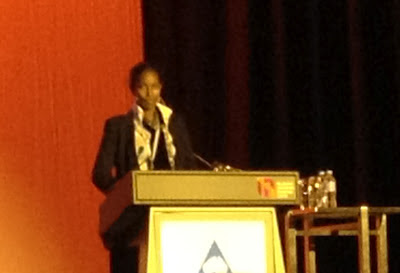Ayaan Hirsi Ali is the author of ‘Infidel’. Her talk was entitled “The Arab Spring”.
I want to like Ayaan Hirsi Ali, but I’ve always been wary of her. I find her admirable because of what she’s been through, and her strong stand against Islam. So why the discomfort?
It’s like this: There are two ways to be anti-Islam. You can be a secularist, or you can be a racist. (No, Islam’s not a race, but people in this group conflate the two.) And while I don’t think she’s a racist, I think she got in with a lot of the very worrying anti-immigrant crowd during her time in the Netherlands, and I think she holds a lot of right-wing views, especially about support for Israel. Maybe the best way to say it is that she’s a hero that I sometimes disagree with, much like Christopher Hitchens (whose place she has stepped into). So I attended her talk ready to be convinced, and was encouraged by much of what I heard.
She started by relating the events of the Arab Spring of 2010. What would a secular spring mean to Northern Africa? Her list:
- An end to human rights violations
- Freedom of speech
- Freedom of press
- Freedom of conscience
- Women’s rights
- Work
- Voting
- Protection from violence
- Economic growth
- Peace with Israel
- End to Islamic terrorism
- Youth would develop a confidence in life before death, instead of a life after death.
However, says Hirsi Ali, what we’re seeing is not a secular spring, but rather a Muslim winter, as old repression is being replaced by religious repression.
There are, however, signs of hope.
1. Voting patterns. Secular parties aren’t winning, but they do exist.
2. The Iran uprising of 2009, which saw citizens protesting against theocrats.
3. The Muslim Diaspora: Ex-Muslims are growing, writing, and communicating with each other.
4. Freedom of expression is increasing. For example, Hamsa Kashgari, a 23 year old Saudi journalist, tweeted an imaginary meeting with Muhammad that was thought to be blasphemous. He fled Saudi Arabia, but was returned, and forced to apologise. Once you start having thoughts like these, says Hirsi, Ali, you do not go back, even if you are forced to apologise.
Hirsi Ali was especially critical of liberals in the West, who were failing to protect secularists in the Arab world. Why is this so? Her view is that these liberals are falling victim to a version of romantic primitivism. Particularly galling were middle-class Western women who convert to Islam and cover themselves. She also thinks ‘white guilt’ may apply.
Most troubling to me was Hirsi Ali’s assertion that conservatives and Christians were the ones who really comprehend the threat that Islam poses, particularly with regard to nuclear proliferation. I assume that means the people that used to be the cheering section for Team Bush, starting wars of choice with the wrong countries. Methinks most Christian conservatives don’t care much for people who look like Ayaan Hirsi Ali.
So what can be done to encourage a true Secular Spring in the Middle East? Her suggestions:
- Develop a secular liberal narrative in the Middle East
- Have policy training for people in these countries
- Defeat radical Islam, which threatens our thinking.


6 May 2012 at 4:43 am
(My first comment didn't take. Attempt #2)
"Most troubling to me was Hirsi Ali's assertion that conservatives and Christians were the ones who really comprehend the threat that Islam poses, particularly with regard to nuclear proliferation."
Ali seems oblivious to the threat posed by right-wing, dominionist Christianity. While fundamentalist Islam and fundamentalist Christianity are very different, they both pose threats to democracy in their own ways around the globe.
In her book NOMAD, Ali advocated for Christian proselytization of Muslims, which I thought was a very bad idea. To boot, when she appeared on THE COLBERT REPORT last year, she contrasted Islam and Christianity but didn't seem to have much information about the latter.
6 May 2012 at 9:49 am
She said something like this later: she mused that perhaps Christianity might serve as a kind of 'halfway house' for Muslims. I think this is terribly misguided; it's true that Christianity is not generally as malignant as Islam at the moment, but it could easily be, and in some places it's not far off. Christianity and Islam are both symptoms of the same disease: irrationality and superstition. Swapping one for the other is no solution.